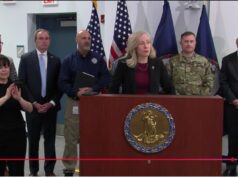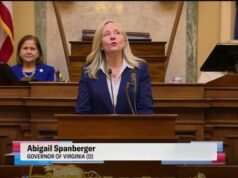See below for the latest from Representatives Jennifer Wexton (D-VA10) and Abigail Spanberger (D-VA07), both of whom are doing excellent work during the Coronavirus crisis. [UPDATED with a press release from Rep. Elaine Luria, VA02]
First, from Rep. Jennifer Wexton (D-VA10):
Wexton Introduces Legislation to Protect Retirement Savings During COVID-19 Crisis
Washington, D.C. — Today, Congresswoman Jennifer Wexton (D-VA) introduced the Retirement Protection Act to safeguard Americans’ retirement savings in the midst of the financial crisis brought on by the coronavirus disease 2019 (COVID-19).
“Americans’ hard-earned retirement savings plans are being devastated by the economic fallout from the COVID-19 pandemic,” said Congresswoman Jennifer Wexton. “For households whose account balances have lost value due to the pandemic, withdrawing funds now when the stock market is down forces them to take significant losses on their investments. By temporarily suspending the RMD, families will be allowed to leave money in tax-deferred accounts without incurring a tax penalty, providing time for the markets to recover.”
Wexton’s legislation would suspend for the current year the required minimum distribution (RMD) for defined contribution retirement plans, including 401(k)s, TSPs, and Individual Retirement Accounts (IRAs). Right now, individuals with these plans are required to begin withdrawing a percentage of their tax-deferred retirement plan when they turn 72 or face a penalty of 50% of the amount that should have been distributed.
As the markets face a historic downturn due to the global COVID-19 outbreak, tax-deferred retirement plans have faced a significant drop in value. Withdrawing funds under these conditions would force individuals on these plans to take serious losses on their investment and jeopardize their economic security in the midst of this health and financial crisis. Suspending the RMD penalty allows individuals to leave that money in their accounts and avoid a penalty and paying tax on the distribution.
A similar measure to temporarily suspend RMDs was included as part of the Worker, Retiree, and Employer Recovery Act of 2008.
Original cosponsors: Don Beyer (VA), Gerald Connolly (VA), Jim Cooper (TN), Joe Courtney (CT), Peter DeFazio (OR), Eleanor Holmes Norton (DC), Chrissy Houlahan (PA), Dan Kildee (MI), Stephen Lynch (MA), Sean Patrick Maloney (NY), Gregory Meeks (NY), Jamie Raskin (MD), Harley Rouda (CA).
The full text of the bill can be found here.
UPDATE: Rep. Wexton has introduced another piece of legislation.
Wexton Introduces Legislation to Ensure Pandemic Preparedness and Safeguard U.S. Financial Security
Washington, D.C. — Today, Congresswoman Jennifer Wexton (D-VA) introduced legislation that would improve coordination and communication among financial regulators in order to better protect U.S. economic and financial systems in the event of a global pandemic. The Interagency Pandemic Guidance for Consumers Act would require swift interagency regulatory guidance for financial institutions, as well as require regulators to convene joint public-private exercises every five years to simulate a severe global pandemic.
“The severity of the COVID-19 pandemic demonstrates the need for increased coordination and communication between regulators and financial institutions,” said Congresswoman Jennifer Wexton. “We need to have plans in place that address operational issues like absenteeism and telework availability. Taking these simple, but important, steps will help safeguard the financial well-being of our families and ensure the financial security of the U.S.”
The legislation would improve interagency coordination by requiring prudential regulators to issue guidance encouraging financial institutions to work constructively with borrowers affected by pandemics and major disasters.
The bill also requires regulators to carry out joint simulations with financial institutions in order to test the resiliency of the financial sector in the event of a pandemic or major disaster. Joint global pandemic exercises have not been done since 2007, when more than 2,700 U.S. financial services organizations participated in a 3-week simulation.
The full text of the bill can be found here.
*****************
Next, from Rep. Abigail Spanberger (D-VA07):
Spanberger Co-Leads Bipartisan Resolution Calling on Administration to Use Full Force of Defense Production Act, Address Personal Protection Equipment Shortages in Central Virginia & Across the Country
Bipartisan Resolution Calls on the Administration to Require Companies to Manufacture Emergency Medical Supplies for Future Sale to the Federal Government
Congresswoman: “Throughout the Past Week, I’ve Had Personal Conversations with Hospital Administrators in Our District Who Lack the Supply Of Personal Protective Equipment They Need to Keep Our Doctors and Nurses Safe in the Weeks And Months to Come”
HENRICO, V.A. – U.S. Representative Abigail Spanberger today introduced a bipartisan resolution calling on the President to make urgent and effective use of the Defense Production Act (DPA) to respond to COVID-19.
In the past week, Virginia has experienced a shortage of personal protective equipment (PPE) such as masks, protective gloves, face shields, and hand sanitizer. To meet the critical supply needs of the U.S. healthcare system during the ongoing public health emergency, Spanberger is urging the President to immediately share with Congress plans for the use of DPA authorities, including targets and timelines to produce supplies such as PPE for healthcare workers. Additionally, the resolution calls for the administration to report to Congress on the results of the ongoing use of these authorities in the fight against the coronavirus.
Spanberger led this resolution alongside U.S. Representatives Andy Levin (D-MI-09), Katie Porter (D-CA-45), Anthony Gonzalez (R-OH-16), Steve Chabot (R-OH-01), Don Bacon (R-NE-02), Dan Kildee (D-MI-05), Diana Degette (D-CO-01), Ted Lieu (D-CA-33), Fred Upton (R-MI-06), Rodney Davis (R-IL-13), Van Taylor (R-TX-03), Mikie Sherill (D-NJ-11), and Bill Huizenga (R-MI-02).
“Promises from a podium do not translate into results on the ground, and the lack of a strategic federal response to equipment shortages in our local hospitals is beyond unacceptable. The administration must use the Defense Production Act’s powers to come to the immediate aid of our healthcare workers on the front lines of the coronavirus crisis,” said Spanberger. “Throughout the past week, I’ve had personal conversations with hospital administrators in our district who lack the supply of personal protective equipment they need to keep our doctors and nurses safe in the weeks and months to come. They are deeply concerned for their employees, and they are alarmed by the potential effects on patients. As Virginia sees a rapid rise in coronavirus cases, the lives of our neighbors are hanging in the balance. We need to see clear targets and timelines for mask and ventilator production, because we cannot afford to jeopardize the lives of our community’s heroes in this moment of unprecedented uncertainty.”
“The President tweeted that he is waiting for a ‘worst case scenario’ to use the Defense Production Act, which is maddening,” said Levin. “Frontline health care workers are already treating patients without the personal protective equipment they need, some falling victim to the virus themselves. A nurse in my district described her ER as a ‘war zone’ in the fight for masks, everyone given one per shift. Soon, our health care workers will be battling for their patients to get the one ventilator available. Why are we waiting for that day to come? While he invoked part of the Defense Production Act last week, no company has reported receiving an order by the Trump Administration to produce the supplies we need.”
“I have said from the beginning that we need all hands on deck, and the bipartisan resolution we introduced today urges the President to use the Defense Production Act to ensure we as a nation unleash the stockpile of supplies to help health care workers and save lives,” said Upton. “The bottom line is that we need to get more Personal Protective Equipment to our medical community who are on the front lines working to keep our nation safe. It should also be noted that the DPA does not nationalize businesses, as some suggest. It does, however, allow the government to direct businesses to make certain supplies that are desperately needed in our fight against the coronavirus. The companies would remain private. Let’s be clear, to address this generational crisis, we need to use every single tool in the tool box.”
“The Defense Production Act exists for situations exactly like this one, where an organized response from industry is vital to national security,” said Porter. “The repeated delays by the Administration make Congressional action an imperative. I’m proud to join with my colleagues to ensure that the federal government properly uses the DPA to secure necessary medical supplies for the COVID-19 response.”
“The President must implement the Defense Production Act immediately,” said Lieu.“ We can’t wait any longer – we need protective equipment and ventilators to fight the COVID-19 outbreak now. We’ve seen some companies and individuals step up to manufacture needed equipment, and though that’s appreciated, we still don’t have nearly enough supplies to address the crisis in front of us. This is a matter of life and death and the President must act accordingly to make sure our healthcare workers have what they need to save lives.”
“This is an unprecedented moment for our nation – a threat unlike any we have experienced in our lifetimes. In order to succeed in slowing the spread and saving lives we must ensure the nurses, doctors, and first responders on the frontlines of this pandemic have the tools and gear they need to get the job done,” said Taylor. “Utilizing the Defense Production Act can help increase production so that we can meet the equipment needs of our healthcare providers.”
“We are in the midst of an unprecedented global health crisis,” said DeGette. “This administration needs to invoke its powers under the Defense Production Act immediately to help provide our health care workers with the life-saving equipment they need to protect themselves and provide patients the care they need. If we don’t act fast, thousands of health care workers could soon be at risk of contracting this virus. If our doctors and nurses aren’t available to care for us, who will?”
Last Friday, the President triggered the DPA, which allows the administration to force companies to manufacture emergency medical supplies for future sale to the federal government. The Spanberger-led resolution states that the U.S. House stands ready to make additional appropriations available to meet the needs of DPA invocation.
Click here to read the full resolution.
This resolution builds on Spanberger’s work to procure essential medical supplies for healthcare workers during the coronavirus pandemic. Last Friday, Spanberger joined a bipartisan letter to top U.S. trade officials at the Office of the U.S. Trade Representative (USTR) and the U.S. Department of Defense urging them to leverage existing trade relationships to prevent shortages of key medical supplies and PPE during the coronavirus pandemic. Hours after the letter was sent, USTR announced they would make medical supplies a trade priority. Click here to read the full letter.
**************
Congresswoman Luria Urges House Leadership to Temporarily Eliminate Copays for Mail Order Prescription Drugs Through TRICARE

WASHINGTON, D.C. – As Congress considers legislation to respond to the COVID-19 pandemic, Congresswoman Elaine Luria sent a letter urging House Leadership to temporarily eliminate copays for mail order prescription drugs through TRICARE.
In her letter, Congresswoman Luria argued temporarily eliminating copays for mail order prescription drugs would allow TRICARE beneficiaries to access their medication at no out of pocket cost while practicing social distancing.
“While the Centers for Disease Control and Prevention recommends staying home and practicing social distancing, TRICARE should similarly incentivize people to follow these guidelines,” wrote Congresswoman Luria. “An easy way to keep people in their home is to temporarily eliminate the copay for mail order drugs, making the cost the same no matter how the beneficiary receives their medication. Service members, retirees, and their families would no longer need to choose between staying safe and accessing prescription drugs without a copay.”
Section 702 of the Fiscal Year 2018 National Defense Authorization act adjusted pharmacy copayments for 2018 through 2027. In 2020, the copay for a 90-day supply of a generic drug is $10 and $29 for a 90-day supply of a brand name drug. However, if a beneficiary picks up their prescription from a Military Treatment Facility, there will be no out of pocket cost. By temporarily eliminating the copay for mail order prescription drugs through TRICARE, beneficiaries will no longer need to visit a Military Treatment Facility to access their prescription drugs during the COVID-19 pandemic.
For the full text of the letter, ![]() please click here.
please click here.
Congresswoman Elaine Luria represents Virginia’s 2nd Congressional District. She serves on the House Armed Services Committee, where she is the Vice Chair of the Seapower and Projection Forces Subcommittee, and the House Committee on Veterans’ Affairs, where she serves as Chair of the Disability Assistance and Memorial Affairs Subcommittee.











